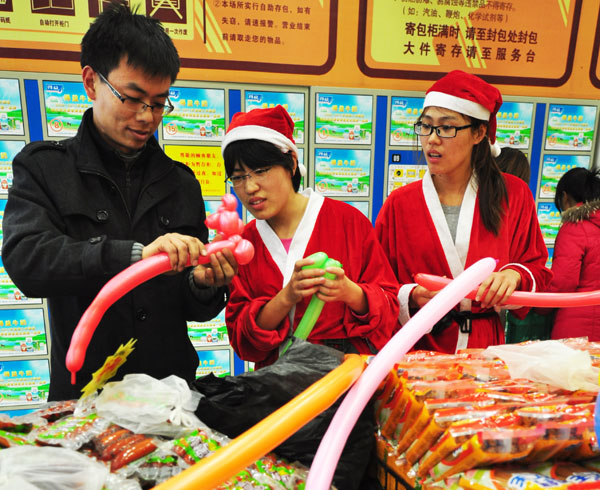Promoters make a difference in supermarket sales
By Wang Zhuoqiong (China Daily) Updated: 2012-12-28 10:33Shopping at supermarkets in China is a constant battle to resist product promotions from young saleswomen, often armed with free samples and dressed in miniskirts.
|
 |
|
Product promoters push their wares at a supermarket in Zouping, Shandong province. Many manufacturers or advertising companies in the country hire young women to help sell their products. [E Guoqing/For China Daily] |
Holding a tray with six paper cups of cooked spicy tofu, Kong Xiaohong, in her 20s, promotes seasonings produced by US-based McCormick & Co Inc.
Based at a supermarket on Beijing's North Fourth Ring Road, Kong's routine is to cook the tofu with one of the seasonings and then ask customers to taste it.
"Nine out of 10 customers buy our products after trying them," said Kong, as she handed out samples.
Kong is among the legions of promoters in supermarkets across China, seeking to lure customers with free samples.
Most of the promoters are hired by the manufacturers or advertising companies. Compared with Europe and the United States, promoters in China are often required to be young, attractive and enthusiastic in order to stand out from their competitors.
The competition between products actually becomes a rivalry between promoters, said a woman promoting a Japanese chocolate brand. "When most of the brands in the same category employ a promoter, those who don't will be left behind," she said, declining to be named.
Their work reflects Chinese consumers' overall lack of loyalty to brands.
In most of the 26 top consumer goods categories sold in China across packaged foods, beverages, personal care and homecare, shoppers who purchase more frequently in a category tend to buy more brands rather than more of the same brands, according to a study conducted by global business consulting firm Bain & Company and Kantar Worldpanel.
Although more than 60 percent of Chinese shoppers have said that brands were their top consideration when purchasing, in reality, they rarely act on that consideration at the moment of purchase, according to the study.
Instead, they are in a near-constant state of trial, without leading to eventual preference or loyalty.
"Our study shows that marketers must pay attention to what Chinese shoppers do, not what they say," said Bruno Lannes, head of Bain & Co's Retail and Consumer Products Practice in China and lead author of the study.
At the imported-food section of a supermarket in Beijing, 23-year-old Liu Lili from Gansu province dispenses Danish cookies to passing shoppers. She wears a red, white and blue striped skirt to attract customers' attention.
"Some elderly customers will ask about the price of the cookies and say they would rather buy a piece of pork. But after they have tried the cookies, they will often change their minds and buy them for their grandchildren," Liu said.
wangzhuoqiong@chinadaily.com.cn
- Focus on innovation must take care of jobs: Mexican economist
- China can show leadership at G20 summit to resist protectionism, boost confidence in global economy: US expert
- G20 expected to be 'ambitious' on innovation, trade, investment: Italian experts
- China's forex reserves data may improve due to a stable yuan
- Chile targets China as main destination for food exports
- Expert says upcoming G20 summit important opportunity to better understand China
- Chinese firm reports record-breaking optic fiber transmission
- China's start-up board turnover continues to gain


















